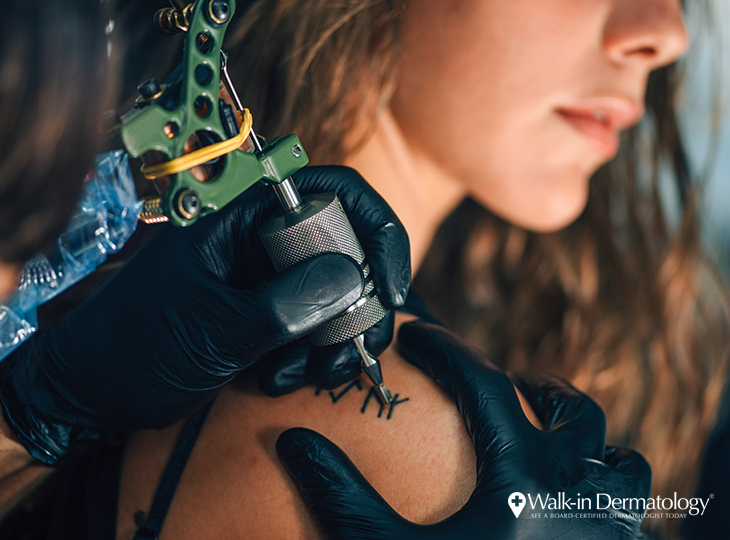Tues: 8:30am - 3:00pm
Wed: 12:00pm - 6:00pm
Thurs: 8:30am - 3:00pm
Fri: Closed
Sat: 8:30am - 12:30pm
Sun: Closed
Greenvale, NY 11548
That Tattoo Could Spell Trouble


Tattoos in America didn’t go mainstream until the 1970s, but in the half century since their popularity has soared across genders, economic classes and age groups.
Yet despite advances in technology, ink and application techniques, tattoos continue to pose real health risks. The question to ask is, does the danger outweigh the desire for personal expression through body art? In many cases, the answer is yes.
Although all tattoo parlors must follow rules set by the Occupational Safety and Health Administration (OSHA) and Centers for Disease Control & Prevention (CDC), there are still plenty of unlicensed tattoo parlors across the United States. Know what you’re getting into before you walk through the parlor door.
So, what are the risks?
The long-term effects of tattoo ink on the skin and body are not fully understood. No government regulatory agency has studied the safety of tattoo ink. Many varieties of ink have been approved for use in cosmetics, although the long-term effects of injecting them beneath the skin are unclear. So there’s the risk of unknown troubles potentially in the years to come.
Of more immediate concern, that dazzling illustration on your skin can potentially cause one or more adverse reactions much sooner rather than later:
- An allergic reaction to the dyes, including severe rash at the tattoo site. Some patients may not develop an allergy to the ink for many years. Red and black ink are often the cause due to the dye pigments used in the ink formulations.
- Skin infections such as a staph infection or cutaneous tuberculosis (a chronic bacterial infection of the skin)
- Overgrowths of scar tissue, including the formation of keloids (raised scars). If you scar easily or ever developed a scar that was bigger than the wound that caused it, rethink getting a tattoo.
- Blood borne diseases, including hepatitis B, hepatitis C, HIV, and tetanus, all of which can be contracted through contaminated, unsanitary needles.
- Granulomas, which are areas of inflamed tissue and can be painful.
- Burning or swelling of the tattooed skin.
- Sun allergies. Some people will develop blisters or painful, itchy bumps around their tattoos whenever the ink is exposed to sunlight.
- Tattoos can trigger some conditions such as psoriasis or eczema.
- Tumorous growths. Though rare, the cause appears to be carcinogens found in some tattoo inks. Considering a tattoo? Find out the ingredients used in the formulation of ink. If the tattoo artist doesn’t know, think seriously about visiting a tattoo artist who does know the product line.
- If you ever need a magnetic resonance imaging (MRI) test, and you probably will at some point in your life, tattoo ink can cause unpleasant side effects during the testing. Many types of ink used for tattoos contain magnetic pigments, which can cause an uncomfortable (and unnerving) tugging sensation on the skin during the MRI procedure, according to WebMD.
- Skin cancers are also known to develop from tattoos.
Infection is the most likely consequence of getting a tattoo. An infection may develop immediately or it may take weeks, even months before symptoms develop around the tattoo.
Right after receiving a fresh tattoo, it’s normal to notice some redness and swelling. You’ll feel sore. During the healing process the skin may flake and begin to itch.
When an infection develops, you’ll notice a different reaction. First, the skin produces a dark redness and pain that gets worse if untreated. Serious infections cause fever, chills and the formation of pus around the infected area. Rashes and painful bumps are also signs of a problem.
When the infection goes from bad to worse
Left untreated, there’s a serious risk of spreading bacterial infection (sepsis) that can become life threatening.
Whether a severe allergy or serious infection, if you notice a change in the skin above and around your tattoo and you experience one or more of the following…
- Trouble breathing
- Racing heartbeat
- Tightness in your chest
- Dizziness
- Persistent stomach ache
- Swelling, pain, flushing, or hives around the affected area…
…Seek immediate medical attention. Your dermatologist will be able to diagnose the problem and advise on a course of treatment.
Celebrate the natural beauty of your body. Just know the risks if you choose to illustrate it as well.
Let Walk-in Dermatology Take Care of You and Your Skin
If you want to be proactive about your skin or if you have concerns about a tattoo or any skin condition – and you need dependable answers fast – you don’t have to wonder, worry or wait. Walk-in Dermatology is here to keep you healthy. Our team of board-certified dermatologists and experienced medical staff will address your concerns and provide the necessary care for all your skin conditions. You can also schedule an appointment with us online.
If you can’t make it to one of our offices, we can set up a Video Visit and even prescribe medications remotely. Contact us today.








